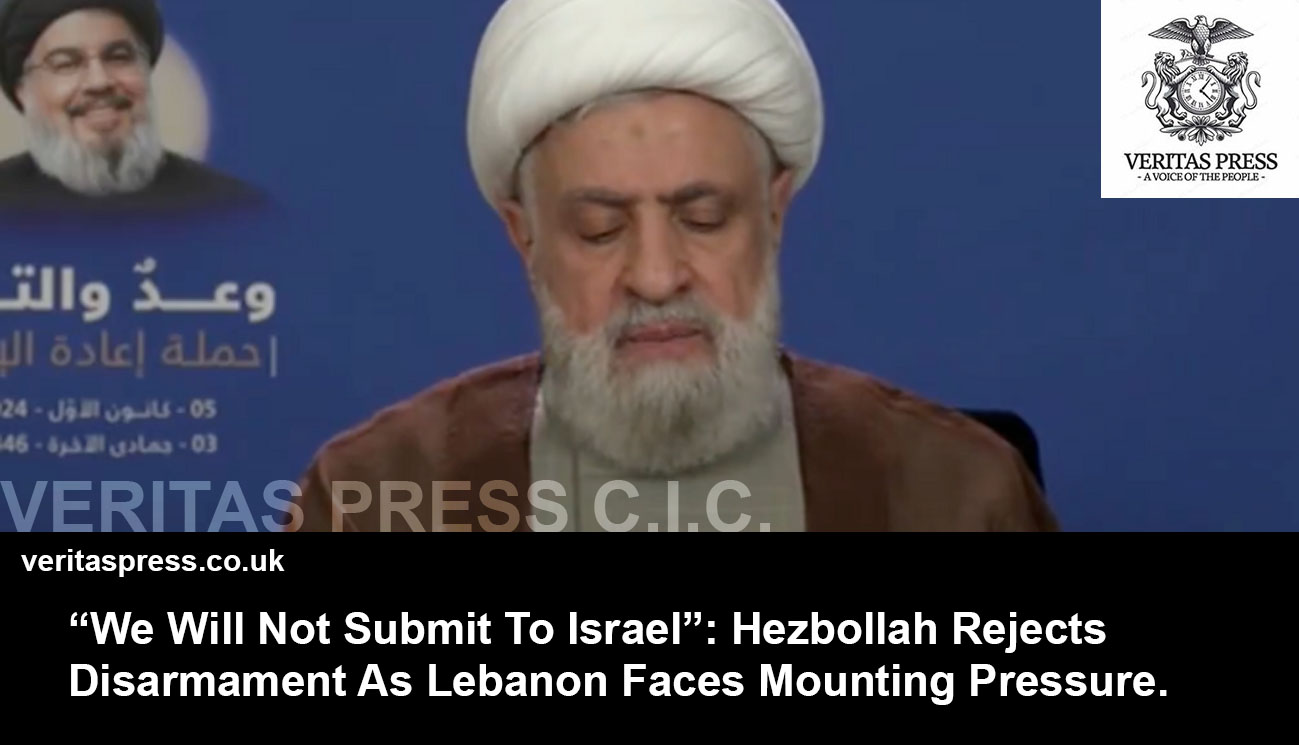Press Release: Veritas Press C.I.C.
Author: Kamran Faqir
Article Date Published: 31 July 2025 at 12:50 GMT
Category: Middle East | Lebanon | US-Israel At War
Source(s): Veritas Press C.I.C. | Multi News Agencies
LEBANON/BEIRUT – In a defiant address marking the anniversary of Commander Fuad Shokr’s assassination, Hezbollah Secretary-General Sheikh Naim Qassem drew a hard line against mounting pressure, both domestic and foreign, for the powerful Lebanese militia to disarm. But behind his combative rhetoric lies a nation grappling with the ghosts of war, the strains of economic collapse, and the threat of a renewed regional inferno.
“Those who call for submitting arms practically demand submitting them to Israel,” Qassem declared on Wednesday. “We will not submit to Israel.”
While Hezbollah’s framing of the issue as one of national sovereignty resonates with its core base, critics argue the group’s intransigence is plunging Lebanon deeper into diplomatic isolation and economic ruin.
A Divided State, A Fractured Society:
In recent weeks, senior U.S. officials, including special envoy Tom Barrack, have made repeated visits to Beirut, pressing Lebanese leaders to issue a formal cabinet commitment to disarm Hezbollah. The U.S. position is blunt: no disarmament, no ceasefire negotiations, no reconstruction aid.
Lebanon’s President Joseph Aoun has seemingly aligned with Washington’s line, calling on all armed groups to “seize this historic opportunity” and hand over their weapons to the state. “It is the duty of all political factions to consolidate arms under legitimate state institutions,” Aoun said in a televised Army Day speech.
A senior government official familiar with the negotiations, speaking on condition of anonymity, told L’Orient Today, “The Americans are linking everything, ceasefire, aid, and even IMF negotiations, to Hezbollah’s disarmament. We are caught between a rock and a hard place.”
“Disarm Or Starve” Diplomacy:
Analysts warn that Lebanon is being cornered into a crisis with no easy exit. In the wake of the 2024 Israel-Hezbollah war, which left over 13,000 dead, mostly civilians, international donors have conditioned an estimated $11 billion in recovery funds on the full disarmament of Hezbollah.
“The Lebanese state has very little leverage right now,” said Randa Slim, a fellow at the Middle East Institute. “The U.S. and Gulf countries are not going to fund reconstruction if Hezbollah remains armed and entrenched. This is coercive diplomacy, disarm or starve.”
Local voices are equally divided. In the southern town of Khiam, still reeling from Israeli airstrikes, displaced resident Amal Khoury told Al Jazeera: “We lost our homes, our families. If giving up weapons will stop the bombs, maybe it’s time. But who guarantees Israel will stop once Hezbollah is gone?”
Hezbollah’s Calculus: Survival Or Escalation?
Hezbollah emerged from the 2024 war battered but unbowed. The targeted killings of former leader Hassan Nasrallah and top commander Hashem Safieddine shook the group’s leadership, but Qassem’s rise has marked a shift toward a more hawkish, security-focused posture.
According to journalist Mohanad Hage Ali of Carnegie Middle East, “Hezbollah is signalling that disarmament would be tantamount to surrender. They view their weapons as the last line of defence against Israeli aggression, but also as a source of domestic political leverage.”
Indeed, Qassem accused U.S. envoy Barrack of issuing “threats of annexation and intimidation” during his July meetings with Lebanese officials. Hezbollah believes the U.S. seeks not only to strip its weapons but to engineer a long-term regional power shift benefiting Israel and its allies.
Civilian Costs, Strategic Ambiguity:
Meanwhile, the ceasefire that was meant to stabilise southern Lebanon remains shaky. Israeli warplanes continue to strike alleged Hezbollah sites, citing violations of the truce. Hezbollah, for its part, has refused to pull all forces north of the Litani River and claims the agreement does not require total disarmament.
UNIFIL peacekeepers say they are caught in the crossfire. A senior officer told Le Monde: “Both sides accuse the other of violating the ceasefire. Civilians are the ones paying the price.”
Eyewitnesses in Tyre reported a surge in Israeli drone activity over the past month. “We live with the constant buzz overhead,” said local schoolteacher Samer Hariri. “Every day we wonder: is it surveillance, or is a missile coming?”
Internal Fractures And Silent Shifts:
Though Qassem insists Hezbollah will “never surrender,” insiders suggest the group is weighing tactical de-escalation. A source close to the party told The Cradle that “non-essential units are being restructured, and some military operations scaled back to preserve strategic depth.”
Activists and civil society groups, however, are increasingly vocal about Hezbollah’s role in obstructing peace. “We’re sick of warlords dictating Lebanon’s future,” said Maya Makhzoumi, a political organiser from Beirut. “We want security, but not at the cost of permanent militarisation.”
A joint statement from over 30 Lebanese NGOs urged the cabinet to assert “the state’s exclusive right to bear arms,” calling disarmament “a precondition for lasting peace and international support.”
A Nation In Limbo:
At a cabinet meeting scheduled for next week, Prime Minister Nawaf Salam will present a U.S.-backed proposal: Hezbollah hands over its weapons, Israel withdraws from southern outposts, and Lebanon receives billions in reconstruction funds and security assistance.
But Hezbollah has refused to commit.
“The equation is simple,” said Qassem. “Stop the aggression, withdraw from our land, return our captives, then we can talk. But not before.”
As Lebanon teeters between sovereignty and collapse, the stakes are higher than ever. The question remains: can a shattered state chart a path forward without first breaking free of the regional proxy war that has held it hostage for decades?
In Summary: A Resistance At A Crossroads, A Nation Held Hostage.
Hezbollah’s defiance may resonate with its base, which sees the group as Lebanon’s shield against Israeli aggression, but its refusal to engage in a serious path toward disarmament is increasingly suffocating the nation’s prospects. In a country ravaged by years of economic collapse, political paralysis, and foreign interference, Hezbollah’s insistence on retaining arms outside the authority of the state has become more of a liability than a liberation strategy.
Yet the crisis is not Hezbollah’s alone. Lebanon today is a battleground for powerful foreign actors who wield influence not through diplomacy, but through destabilisation and economic asphyxiation. The United States, by conditioning desperately needed reconstruction aid on disarmament, has transformed economic lifelines into bargaining chips. Israel continues to carry out near-daily violations of the ceasefire while occupying key areas in the south, creating a climate of permanent insecurity. And Gulf states have largely turned their backs, withholding support in line with U.S. pressure.
This multifaceted pressure campaign, military, financial, and diplomatic, has left Lebanon entrapped in a geopolitical vice. As one Beirut-based economic analyst told Al-Akhbar, “What’s happening is not just a political deadlock, it’s a systematic strategy of impairment. Starve the institutions, bleed the currency, and then demand surrender.”
Sheikh Naim Qassem’s fiery rhetoric about sovereignty rings hollow in this context. The Lebanese state, fractured and financially incapacitated, has little ability to enforce sovereignty when foreign powers hold its reconstruction, debt relief, and even food security hostage to political preconditions.
Behind the slogans of resistance lies a grim reality: the weapons that once symbolised opposition to Israeli occupation have become tools in a broader struggle, one increasingly disconnected from the needs and will of the Lebanese people. As one UN official in Naqoura told L’Orient-Le Jour, “This isn’t about defending Lebanon anymore. It’s about who controls Lebanon, and how much the population is willing to endure before breaking.”
Without a credible national consensus on the monopoly of arms, and without a shift in the international community’s coercive approach, Lebanon may not just fail to recover, it may cease to function. The question now is not only whether Hezbollah will disarm, but whether Lebanon can survive this siege, military, economic, and political, or whether it will remain a hostage, suspended between foreign agendas and internal paralysis.
Tags:




























Leave a Reply